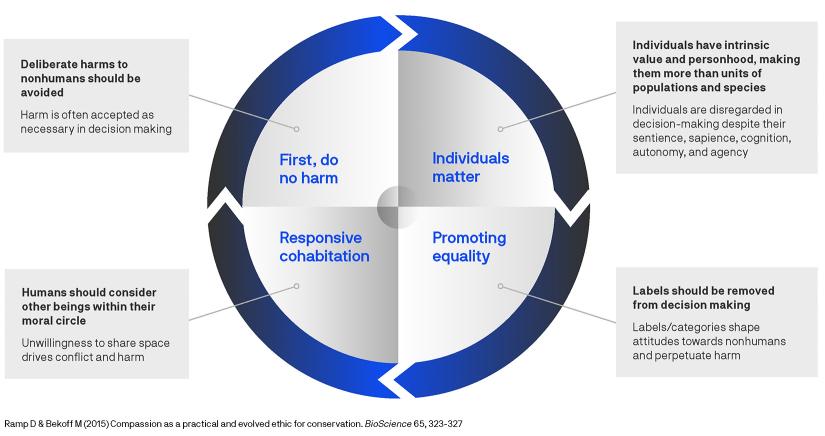The UTS Centre for Compassionate Conservation (CfCC) is dedicated to transforming conservation actions by reimagining the relationship between humanity and the natural world.

About the Centre for Compassionate Conservation
What is compassionate conservation?
How should conservation act to truly represent, protect, and respect all living beings? Using compassion as a means to critically rethink what conservation is for, our approach challenges traditional conservation paradigms that perpetuate the distinction between human and more-than-human worlds. It does so by recognising the intrinsic value and rights of all living beings, advocating for more inclusive and ethical conservation actions that acknowledge we live together in multispecies societies, sharing one planet.
The approach includes:
- Questioning, challenging, and rethinking conservation norms
- Viewing humans and non-humans as interconnected
- Advocating for the wellbeing and flourishing of all beings
- Emphasising non-violent means of cohabitation.
A transdisciplinary research approach
The CfCC is situated in the UTS Transdisciplinary (TD) School, a leader in the field of transdisciplinary innovation and creative intelligence. The TD School’s ethos informs our transdisciplinary approach as we work between, across, and beyond disciplines to establish compassionate conservation as a robust area of scholarship.
We work across the world to deliver evidence-based and compassion-led solutions to pressing conservation challenges through:
- recognising more-than-human rights, where every individual being, human or non-human, deserves consideration and respect
- advocating for inclusivity of all beings in practice, planning, and policy
- designing new methods for assessing wild animal welfare
- championing ignored or maligned species
- supporting wildlife-friendly land-use practices
- reimagining conflict as negotiated cohabitation between humans and other species.
The principles of compassionate conservation
Compassionate conservation is not a fixed framework and typically encompasses a wide range of viewpoints and perspectives. However, four guiding principles are generally agreed upon as useful for translating compassion into actionable outcomes for relationships between humans and non-humans.
These four guiding principles are central to our research, teaching and engagement activities at UTS and beyond:
- First, do no harm: deliberate harm to non-humans should be avoided where possible
- Individuals matter: individuals have intrinsic value, rights, and personhood, making them more than units of populations and species
- Promoting equality: affording all beings rights and value encourages the removal of labels and hierarchy in conservation decision-making
- Responsive cohabitation: consideration of other beings within our moral circles is essential when deliberating on coexistence strategies.
Guiding principles in Compassionate Conservation

Towards just and equitable conservation futures
We envision a future where conservation practices are grounded in compassion and respect for all life forms. Compassionate conservation emphasises the protection of individuals by employing a mix of virtue (how we ought to be) and deontological (what we ought to do) ethics. These ethical approaches are used to explore the synergy between animal welfare and conservation sciences.
Compassionate conservation is focused primarily on the lives of non-human animals not under the direct care of people (in other words, ‘wild’). The sentience and consciousness of individual non-human animals is used as inspiration to reframe emphasis towards the relational experiences between human and non-human.
Our goal is to move global conservation practices towards just, equitable, and respectful outcomes by de-emphasising normative paradigms like human exceptionalism, instrumentalism, and neoliberalism.
Considering non-human experience
Through scientific and philosophical understanding, compassionate conservation prioritises moral attentiveness to the inclusion of individual non-humans and their unique experiences when deliberating on actions humans may take in the name of conservation.
To do so, representing the complexity of experiences in individual non-humans requires the use of detailed and verified models of how internal and external factors affect their subjective mental experience – in other words, their welfare – and how that contributes to their wellbeing.
More than just protection from harm and the affordance of freedom, compassionate conservation extends to consideration of the wisdom that accrues through social learning among interacting collectives (i.e., non-human cultures), and individual expressions of agency and autonomy that lead us to extend personhood to non-humans.
